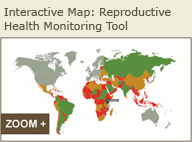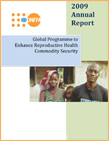News
Documenting Progress in Securing the Supply of Reproductive Health Commodities
- 02 July 2010
News
ADDIS ABABA, Ethiopia — Representatives from UNFPA offices in Ethiopia, Burkina Faso, Laos, Madagascar, Mali, Nicaragua, Niger and Sierra Leone met here last week with colleagues from headquarters and the procurement office in Copenhagen to review progress on ensuring a secure supply of reproductive health commodities.

Those countries, and more than 60 others, are part of the Global Programme to Enhance Reproductive Health Commodity Security, a systematic approach to moving beyond ad hoc responses to stockouts towards sustainable, country-driven approaches for securing essential reproductive health supplies. The Programme is also designed to enhance MDG Goals on maternal health, national targets to reduce maternal mortality and increase family planning coverage.
The host country served as a good example of how much progress can be made in reaching even remote populations when the political will, funding and logistics systems are in place. Contraceptive prevalence rates in Ethiopia have doubled, from 14 per cent to 30 per cent, in four years.
While contraceptive prevalence rate is rising in Ethiopia, many potential users, especially those in rural areas, lack information or have misconceptions about long-acting methods and permanent methods. An estimated 34 per cent of sexually active women would like to stop childbearing or delay their next birth by at least two years, but are using no contraceptive method.
To address this issue, UNFPA provided a total of $14 million in 2008/9 to support family planning programming in Ethiopia. In 2009, the Ministry of Health, with UNFPA and partners, embarked on an initiative to both increase access to long-term contraceptive methods and to create demand through strategic communications. Health extension workers play a key role in expanding access to family planning information and services to all districts within the country.

Ongoing support to encourage family planning over the last three years has meant a significant increase in contraceptive prevalence for a number of other countries, as well. According to the 2009 annual report, for the fund, which was presented at the meeting, the contraceptive prevalence rate in Mongolia has increased nearly 13 percentage points in Mongolia in less than five years, with increases of 11 and 10, respectively in Madagascar and Lao PDR in the same time period.
The annual report documents other signs of progress as well. Programme support helped Cambodia manage a secure stream of essential supplies, with no major stockouts, at all its frontline health facilities. Kenya saw an increase in contraceptive prevalence after 10 years of stagnation. And the Maldives government has committed to purchasing all its country’s contraceptives by end of 2010. One of the goals of the programme is to get countries to allocate funds for contraceptives and other reproductive health commodities.